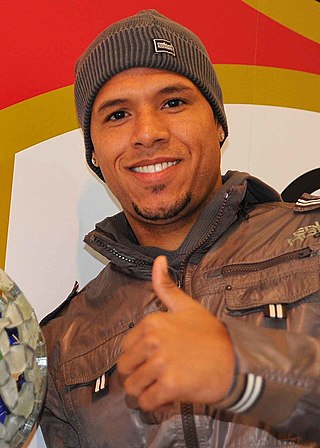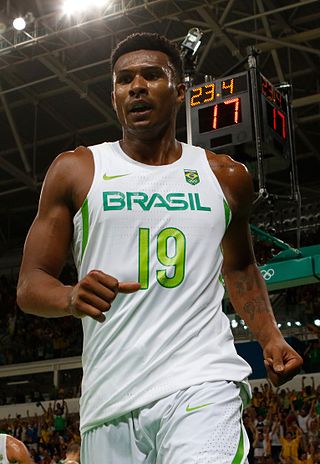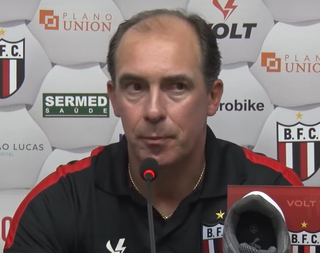External links
- Leandro at J.League ( archive ) (in Japanese)
- (in Portuguese) globoesporte.globo.com
- (in Portuguese) CBF
- (in English) sambafoot [ permanent dead link ]
| Personal information | |||
|---|---|---|---|
| Full name | Leandro Lessa Azevedo | ||
| Date of birth | 13 August 1980 | ||
| Place of birth | Ribeirão Preto, Brazil | ||
| Height | 1.73 m (5 ft 8 in) | ||
| Position(s) | Winger Forward | ||
| Youth career | |||
| 1997–1998 | Botafogo-SP | ||
| Senior career* | |||
| Years | Team | Apps | (Gls) |
| 1999–2000 | Botafogo-SP | 2 | (0) |
| 2001–2003 | Corinthians | 114 | (17) |
| 2003–2004 | Lokomotiv Moscow | 6 | (0) |
| 2004 | → Goiás (loan) | 41 | (14) |
| 2005 | → Fluminense (loan) | 30 | (5) |
| 2006–2007 | São Paulo | 65 | (10) |
| 2008–2009 | Tokyo Verdy | 54 | (29) |
| 2010–2012 | Grêmio | 22 | (0) |
| 2011 | → Vasco da Gama (loan) | 31 | (1) |
| 2012 | → Comercial (loan) | 7 | (0) |
| 2013 | Fortaleza | 12 | (1) |
| 2013–2014 | Botafogo-SP | 14 | (1) |
| 2015–2016 | Catanduvense | 13 | (1) |
| *Club domestic league appearances and goals | |||
Leandro Lessa Azevedo (born 13 August 1980), simply known as Leandro, is a Brazilian former footballer who played as a striker.
| Club performance | League | Cup | League Cup | Total | ||||||
|---|---|---|---|---|---|---|---|---|---|---|
| Season | Club | League | Apps | Goals | Apps | Goals | Apps | Goals | Apps | Goals |
| Japan | League | Emperor's Cup | J.League Cup | Total | ||||||
| 2008 | Tokyo Verdy | J1 League | 22 | 2 | 0 | 0 | 5 | 0 | 27 | 2 |
| 2009 | J2 League | 32 | 7 | 0 | 0 | - | 32 | 7 | ||
| Country | Japan | 54 | 9 | 0 | 0 | 5 | 0 | 59 | 9 | |
| Total | 54 | 9 | 0 | 0 | 5 | 0 | 59 | 9 | ||

The Sociedade Esportiva Palmeiras, commonly known as Palmeiras, is a Brazilian professional football club based in the city of São Paulo, in the district of Perdizes. Palmeiras is one of the most popular clubs in South America, with an approximate 21 million supporters and 184,680 affiliated fans. Despite being primarily a football club, Palmeiras competes in a number of different sports. The football team plays in the Campeonato Paulista, the state of São Paulo's premier state league, as well as in the Brasileirão Série A, the top tier of the Brazilian football league system.

São Paulo Futebol Clube is a professional football club in the Morumbi district of São Paulo, Brazil. It plays in Campeonato Paulista, São Paulo's premier state league and Campeonato Brasileiro Série A, the top tier of Brazilian football. Despite being primarily a football club, São Paulo competes in a wide variety of sports. Its home ground is the multipurpose 72,039-seater MorumBIS Stadium, the biggest private-owned field in Brazil. São Paulo is Brazil’s biggest worldwide champion and also one of the only two clubs that have never been relegated from the top division, the other being Flamengo.

Luís Fabiano Clemente, commonly known as Luís Fabiano, is a retired Brazilian professional footballer who played as a striker most notably for Sevilla, São Paulo, and the Brazil national team.

The Torneio Rio–São Paulo was a traditional Brazilian football competition contested between São Paulo and Rio de Janeiro teams from 1933 to 1966, in 1993 and from 1997 to 2002.

Rogério Ceni is a Brazilian professional football coach and former player who is in charge of Bahia. He is considered one of the all-time greatest Brazilian goalkeepers and is recognised by the International Federation of Football History & Statistics as the goalkeeper to have scored the most goals in the history of football. During the height of his career (2005–2008) he was also recognized as one of the best goalkeepers in the world.

Leandro Mateus Aparecida Barbosa, also known as Leandrinho Barbosa, is a Brazilian former professional basketball player who is an assistant coach for the Sacramento Kings of the National Basketball Association (NBA). He also represented the senior Brazilian national basketball team. Barbosa previously won the NBA Sixth Man of the Year Award, with the Suns in 2007, and an NBA championship with Golden State in 2015. In Brazil, he is also commonly known by his nickname "Leandrinho" Barbosa, and in the United States, Barbosa was nicknamed "The Brazilian Blur", referring to his playing speed. At a height of 1.92 m tall, Barbosa played at the shooting guard position.
Luís Carlos Nunes da Silva, nicknamed Carlinhos, played for Flamengo between 1958 and 1969. Because of his elegant football and his thin voice, he was known as "The Violin". In Flamengo, he won the 1961 Torneio Rio-São Paulo and twice the Rio State Championship.
The 1971 Campeonato Brasileiro Série A was the first official Brazilian football championship, and 15th edition overall of the Série A following the Taça Brasil and Torneio Roberto Gomes Pedrosa tournaments. Organized by the Brazilian Confederation of Sports (CBD), it was won by Atlético Mineiro.
Carlos Renato de Abreu, known as Renato or Renato Abreu, is a Brazilian former association football centre midfielder.

Athirson Mazzoli e Oliveira,, better known as Athirson, is a Brazilian football coach and former player who played as a left-back.

Jenílson Ângelo de Souza, usually known as Júnior, is a Brazilian former association footballer who played as a left back.
Oswaldo de Oliveira Filho, known as Oswaldo de Oliveira, is a Brazilian football manager.
Leandro da Silva Wanderley, simply known as Leandro, is a Brazilian footballer who plays for Associação Desportiva Cabofriense as a left back.
Leandro Lopes Luiz, best known as Leandro Lopes, is a Brazilian pop rock and axé music singer and songwriter.
Leandro Vilas Boas Simioni, also known as Leandro Testa, is a Brazilian former professional footballer. In December 2010 Simioni was involved in a car accident in Brazil, he was seriously injured and left paralyzed from the waist down.

Paulo César Baier, known as Paulo Baier, is a Brazilian football manager and former player who played as an attacking midfielder.
Euller Elias de Carvalho is a Brazilian retired football player at the position of striker. Throughout his career, he was nicknamed "The Son of the Wind" for his amazing pace.

José Ivanaldo de Souza, or simply Souza, is a Brazilian former footballer who played as an attacking midfielder.
The 2018 South American Rugby League Championship was held in São Paulo, Brazil from November 23 to 25, 2018. It was the inaugural edition of the tournament featuring three teams: Brazil, Argentina and Colombia. The South American Cup also features a diverse range of matches, including women's international clash between Brazil and Argentina, a second-division showdown between the two nations, and an Under-17's encounter between Brazil and Argentina.